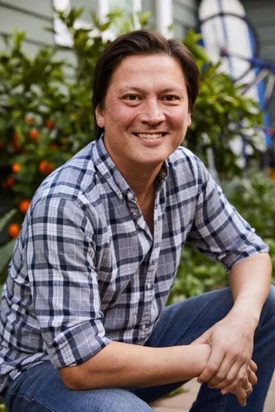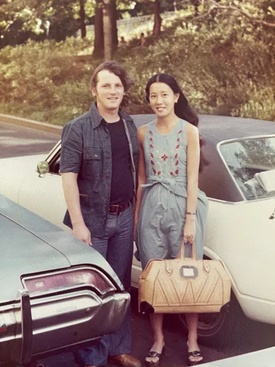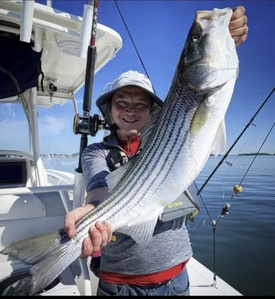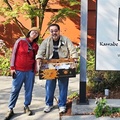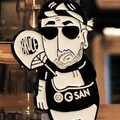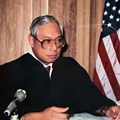James “Kenji” López-Alt, Japanese American chef and expert food writer, is arguably the world’s most famous celebrity food influencer.
Born in Boston and now living in Seattle, Kenji’s rise to fame has its own story and currently, his social media presence is second to none — his YouTube channel has 1.2M subscribers (more than the New York Times [NYT] cooking channel) and nearly 500K followers on Instagram (@kenjilopezalt). He has published three NYT best-selling books: The Food Lab — Better Home Cooking Through Science (2006), Every Night is Pizza Night (2020), and his latest book, The Wok, Recipes and Techniques (2022), which features 200 easy-to-follow, well-tested recipes with 1,000 color photos.
Seattle Uwajimaya will host a book signing event with Kenji on Friday October 14. The North American Post’s contributor Elaine Ikoma Ko interviewed Kenji in July. Excerpts from the interview follow.
* * * * *
Let’s start with learning a bit about your parents — your mother is from Japan and your father is an award winning geneticist and immunologist?
My mother, Keiko Nakanishi, is Japanese, born in Nagoya and grew up in Nagoya and Tokyo. She came to the U.S. when she was a teenager to finish junior college. She moved to California (yes, all by herself) and went to the Mills School of Design. My father, Frederick Alt, grew up in rural western Pennsylvania and his father was a steel worker.
My parents met when he was in graduate school at Stanford University where my father wanted to study science and then later, became a geneticist in immunology. They were married in 1974. I think they were both kind of hippies. They’ll deny this, but I’ve seen the photos!
My older sister was born in California. My parents then moved to Boston where I was born and then to New York where my younger sister was born.
Today, my father is still a geneticist at Harvard University and manages a lab at the Children’s Hospital in genetics research. My mother still lives in New York.
Please share some recollections about your Japanese grandmother and grandfather.
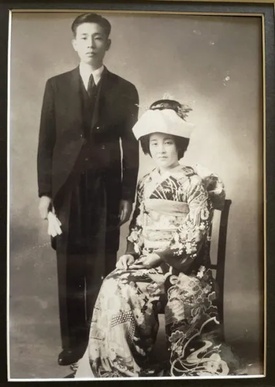
wedding photo, 1947. Photo courtesy of J. Kenji López-Alt.
My maternal grandparents were from Japan and came to the U.S. shortly after my parents were married. My grandfather, Koji Nakanishi, was an organic chemist and was actually the first Japanese organic chemist working in the U.S. at Columbia University.
I grew up in New York from about four years old until age 18. When we were living in New York, we lived in an apartment building—we lived in apartment #10J and my Japanese grandparents were in apartment #9J so I grew up very close to them.
My grandmother, Yasuko Nakanishi, didn’t speak very much English so Japanese was the main language. She was a devoted mother and grandmother and loved to spend time with her daughter and grandchildren.
They stayed in New York until my grandmother passed away in 2007 and my grandfather passed away just two years ago. He loved his work so he worked every day in chemistry until he could no longer go to work.
You go by Kenji, not your given first name, James, and you don’t identify yourself as Chef Kenji, is that correct?
Since before I can even remember, I always went by nicknames but I told my parents that I wanted people to call me Kenji as opposed to James; so ever since I was a little kid, I went by Kenji. I also had a nickname, Kabuki, which is also something that I asked my parents to call me up until I was about 12 or 13 years old.
Today, I’m not officially a chef anymore because I no longer have a restaurant. But even when I had a restaurant, I was not much into titles. I would always ask people to just call me Kenji. But some people will still refer to me as Chef Kenji.
I understand that your father enjoyed Chinese food and your mother cooked Japanese food — did they nurture your cooking passion?
Well, I wasn’t particularly interested in cooking as a kid. I did watch a lot of cooking shows on PBS (Pubic Broadcasting Service) like Julia Child in Japan, The Galloping Gourmet, and other great chefs. But I also liked educational shows, like artist Bob Ross, whether cooking or painting or anything else.
Yes, my father was really passionate about Chinese food! Boston and New York both have very robust Chinatowns and Chinese populations. We spent a lot of time going to all the restaurants in Chinatown and getting familiar with Chinese American cuisine. At that time in New York, it was mainly Cantonese or Hong Kong style food. In Boston, there was Sichuan food, but over the years, I think both cities have developed more regional Chinese cuisines. We spent a lot of time trying to familiarize ourselves with those foods. Chinese food was always my favorite food growing up, other than Japanese food.
My mom, having grown up in Japan, did a lot of Japanese home cooking. She made traditional Japanese dishes, but a lot more of the food she cooked was more yoshoku style, that is, westernstyle Japanese food like hamburg (hambaagu) steak and curry rice (karē raisu). I think she felt this urge to learn American food as well, so she also cooked NYT and Betty Crocker recipes.
My mom was the practical cook, doing all the daily cooking, and my dad would cook on weekends or special occasions. He would often cook those special occasion dishes which, as a kid, I enjoyed a lot more.
Today, I’m taking the opposite role. I have two kids of my own and I make all the meals for the family; so it’s like, let’s just get it done!
How did you fall into cooking?
I went to school as a biology major so I fell into cooking quite accidentally.
I spent a couple of summers in high school and college, working in biology labs in the summers. After my third summer doing that, I realized that I didn’t actually enjoy lab work very much. After my sophomore year of college, I needed to get a summer job. I happened to go into one local Boston restaurant where they said they had a cook who didn’t show up that day and if I could start working immediately, I could have a job as a cook for the summer.
And, as soon as I got into that kitchen, I loved it.
I ended up loving the physical work of cooking and restaurant cooking is quite different from home cooking. Being young, I really enjoyed the adrenaline of getting food out fast and making sure that it was up to a certain level of quality. Like if I have these 20 different orders, how am I going to cook them efficiently?
It was also the act of cooking. That was when I knew this was going to be my career.
I did finish school with a degree in architecture. I spent about six months working in an architecture firm, just to make sure what career I wanted to take, at least for my mom’s sake, because I didn’t think my mom wanted to be the mother of a cook.
* This article was originally published in The North American Post on September 23, 2022.
© 2022 Elaine Ikoma Ko


